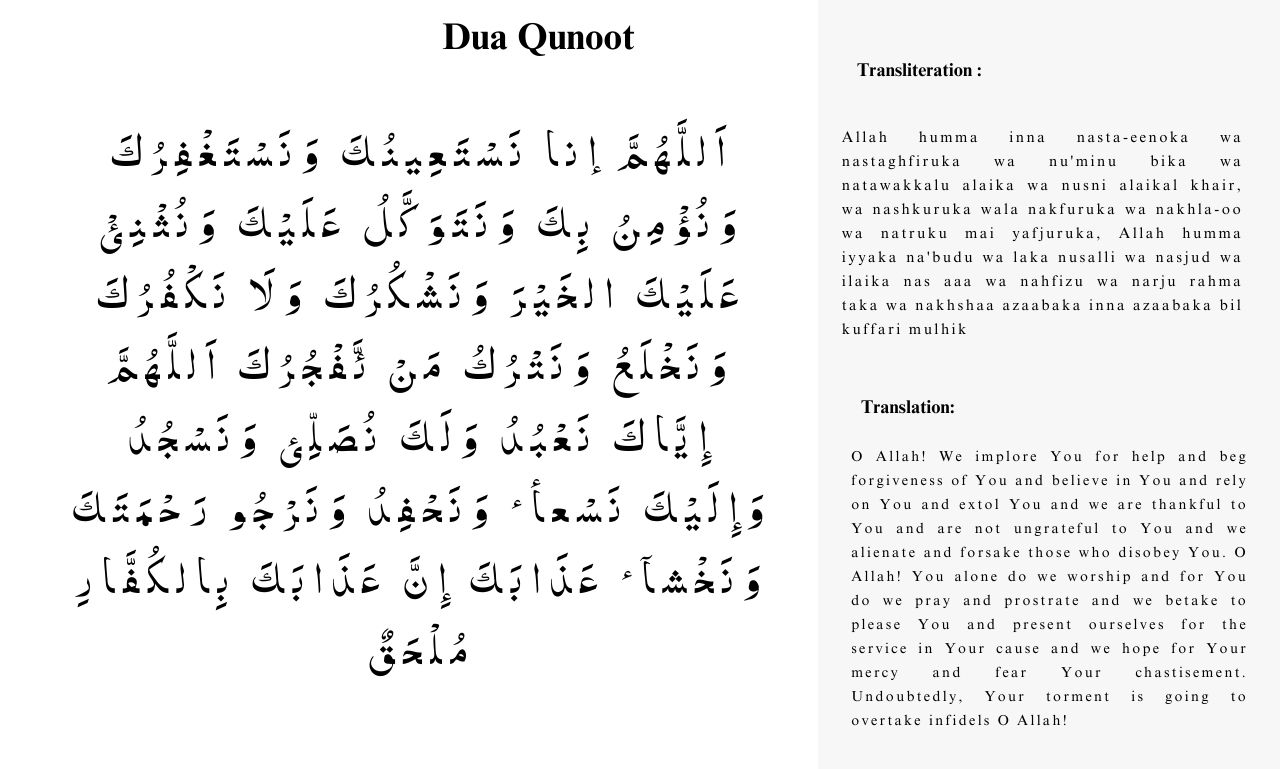Dua e Qunoot is a special prayer that Muslims say during the last rak’ah of the Witr prayer, which is usually prayed at night. You can find the Dua e Qunoot transliteration, and English translation of Dua Qanoot and a picture that you can download to help you memorize it.
If you’re wondering if Qunut is in the Qur’an, the answer is no. It’s actually a practice taught by Prophet Muhammad (Sallallahu Alaihi Wasallam).
Some people might be confused about whether to say this Dua before or after bowing (Ruku) in the prayer. According to Hadith, it’s okay to say the Dua either before or after Ruku.
Dua e Qunoot Transliteration, English Translation
Dua e Qunoot is a powerful prayer in Islam that allows us to seek Allah’s (SWT) help and mercy, especially during difficult times.
Reciting this dua helps strengthen our faith and deepen our connection with Allah (SWT).
There are specific steps to follow when saying Dua e Qunoot during the Witr prayer, so make sure to read it carefully to understand fully.

Dua e Qunoot Hadith
It was narrated by Ubayy bin Ka’b that:
The Messenger of Allah (Sallallahu Alaihi Wasallam) used to pray witr with three rak’ahs. In the first he would recite:
“Glorify the Name of Your Lord, the Most High” in the second: “Say: O you disbelievers!”, and in the third: “Say: He is Allah, (the) One”. And he would say the Qunoot before bowing, and when he finished he would say: Subhanal-Malikil-Quddus (Glory be to the Sovereign, the Most Holy) three times, elongating the words the last time.
Sunan An Nasa’i, Vol. 2, Book 20, Hadith – 1700
How to Perform Dua e Qunoot
Raise Your Hands: After finishing the second Sajdah in the last Rak’ah of the Witr prayer, lift your hands up in supplication.
Recite a Short Prayer: Start by saying, “Rabbana atina fi ad-dunya hasanatan wa fil akhirati hasanatan waqina ‘adhaban-nar” from Surah Al-Baqarah, verse 201.
Begin Dua e Qunoot: Proceed to recite the Dua Qunoot, which includes your heartfelt requests and praises to Allah.
Seek Mercy and Forgiveness: Conclude the Qunut by asking Allah for His mercy, forgiveness, and blessings for yourself and others.
Finish the Prayer: After completing the Dua, continue with the rest of the prayer as usual, including Tashahhud and Tasleem.
Perform this dua sincerely every day to seek Allah’s guidance and blessings. This practice helps us express our reliance on Allah’s mercy and guidance in every aspect of our lives.
Benefits of Reciting Dua e Qunoot
Dua e Qunoot brings many blessings, including:
Asking for Forgiveness: This prayer offers a chance to seek forgiveness for past mistakes and sins, asking Allah to forgive us.
Strengthening Your Bond with Allah: Regular recitation of Dua Qunut helps deepen your connection with Allah (SWT), allowing you to seek His mercy and protection from His punishment.
Protection and Guidance: Through this supplication, you ask Allah for protection from harm and guidance to navigate life’s challenges.
Expressing Gratitude: Reciting Qanoot is a meaningful way to show gratitude for Allah’s countless blessings and favors.
Seeking Help from Allah: This powerful dua enables Muslims to seek Allah’s assistance and place their trust in Him during times of need.
Sign Up to learn Duas and the Holy Quran
If you are interested in learning more Duas, supplications, and the Holy Quran for yourself or your children, sign up for a one-week free trial of the following courses:
Sign up today and get a one-week free trial!


